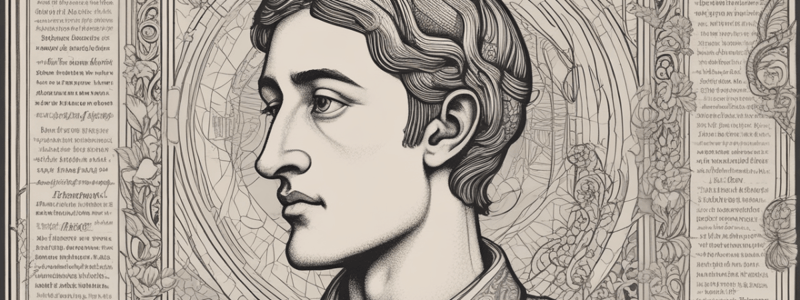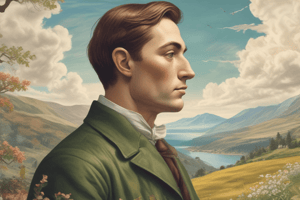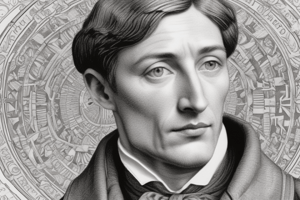Podcast
Questions and Answers
What does the phrase 'black hours' represent in the poem?
What does the phrase 'black hours' represent in the poem?
The depression Hopkins has endured throughout the night
What is the significance of the phrase 'longer light's delay' in the poem?
What is the significance of the phrase 'longer light's delay' in the poem?
The drawn-out day ahead of him
What literary device is used in the line 'But where I say Hours I mean years, mean life.'?
What literary device is used in the line 'But where I say Hours I mean years, mean life.'?
Hyperbole
What is the simile used by the poet to describe his cries for help?
What is the simile used by the poet to describe his cries for help?
What literary device is used in the phrase 'Bones built in me, flesh filled, blood brimmed the curse'?
What literary device is used in the phrase 'Bones built in me, flesh filled, blood brimmed the curse'?
How does the poet describe the state of the 'lost' souls in the poem?
How does the poet describe the state of the 'lost' souls in the poem?
Flashcards are hidden until you start studying
Study Notes
The Poem's Context and Themes
- The poem is a Petrarchan sonnet that explores the poet's mental turmoil and depression in the 1880s in Dublin.
- The poem's themes include unrelenting depression, personal suffering, mental health, and the loss of connection to God.
Style and Structure
- The poem employs the personal pronoun 'I' to convey the poet's personal experiences and emotions.
- The poem uses forceful sound effects, including alliteration and sibilance, to create a foreboding rhythm.
- The poem features difficult syntax at times, as well as caesura and enjambment, which adds to its emotional intensity.
Analysis of Key Quotes
- "I wake and feel the fell of dark, not day" suggests the poet's feeling of being trapped in darkness and depression.
- The "fell" of dark may symbolize the malevolent or darker side of night, emphasizing the poet's sense of foreboding.
- "What hours, O what black hours we have spent" highlights the poet's anguish and suffering throughout the night, with "we" suggesting that every part of his being has endured the pain.
Imagery and Metaphor
- The "black hours" represent the poet's depression, and the use of "we" suggests a collective suffering of his mind, body, and spirit.
- The "heart" is addressed as the core of the poet's being, which has suffered the most.
- The "longer light's delay" may symbolize the drawn-out day ahead, emphasizing the poet's sense of despair.
- The poet likens his cries to "dead letters sent" to someone who will not respond, conveying his feelings of futility and distress.
The Poet's Inner Turmoil
- The poet describes himself as "gall, I am heartburn," suggesting a sense of inner corrosion and suffering.
- The "God's most deep decree" implies a sense of divine judgment or punishment, which the poet feels he must endure.
- The poet's blood is said to "brim the curse," emphasizing the overwhelming nature of his suffering.
The Poet's Spirit and Redemption
- The "selfyeast of spirit" is compared to a dull dough that sours, suggesting a sense of spiritual decay and loss of redemption.
- The poet recognizes that he is like the "lost" souls of those damned, with his "sweating selves" evoking a sense of visceral and palpable torture.
Studying That Suits You
Use AI to generate personalized quizzes and flashcards to suit your learning preferences.



